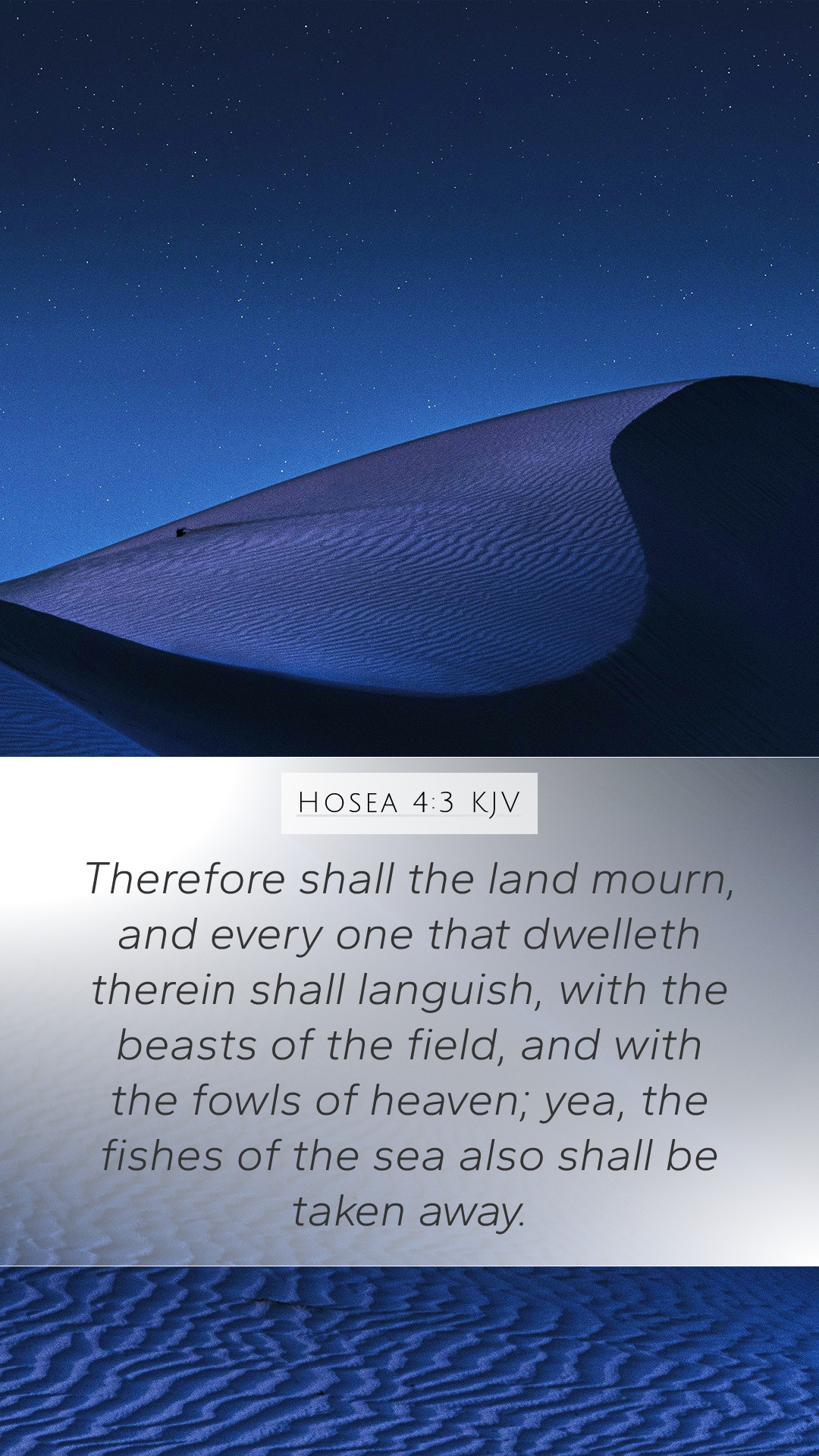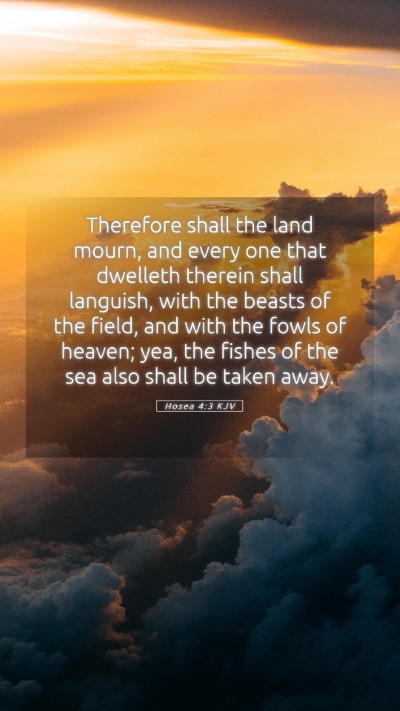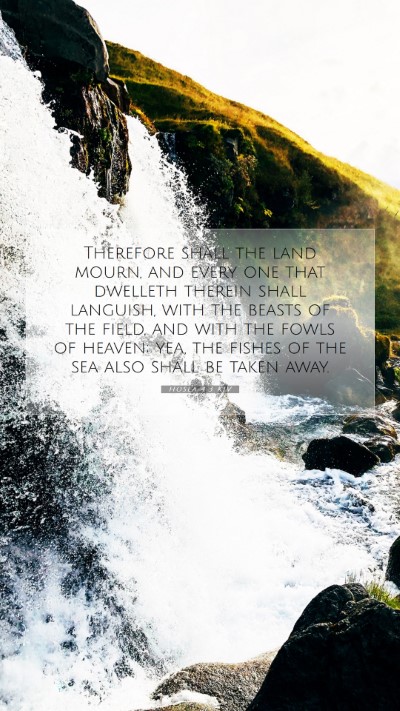Old Testament
Genesis Exodus Leviticus Numbers Deuteronomy Joshua Judges Ruth 1 Samuel 2 Samuel 1 Kings 2 Kings 1 Chronicles 2 Chronicles Ezra Nehemiah Esther Job Psalms Proverbs Ecclesiastes Song of Solomon Isaiah Jeremiah Lamentations Ezekiel Daniel Hosea Joel Amos Obadiah Jonah Micah Nahum Habakkuk Zephaniah Haggai Zechariah MalachiHosea 4:3 Meaning
What is the meaning of Hosea 4:3?
Therefore shall the land mourn, and every one that dwelleth therein shall languish, with the beasts of the field, and with the fowls of heaven; yea, the fishes of the sea also shall be taken away.
Hosea 4:3 Bible Verse Meaning
Understanding Hosea 4:3 - A Biblical Exegesis
The verse Hosea 4:3 states: "Therefore shall the land mourn, and every one that dwelleth therein shall languish, with the beasts of the field, and with the fowls of heaven; yea, the fishes of the sea also shall be taken away." This verse serves as a profound reflection on the consequences of Israel's unfaithfulness to God, and it provides a poignant insight into the relationship between sin, the natural world, and divine judgment.
Contextual Background
Hosea, a prophet of the Old Testament, primarily ministered to the northern kingdom of Israel during a time of spiritual and moral decline. His prophetic messages, often characterized by stark images and metaphors, depict the intimate relationship between God and His people, portraying God’s love and the people's infidelity. To fully grasp the meaning of Hosea 4:3, it is essential to consider both the historical context of Israel at that time and the overarching themes present in Hosea's writings.
Theological Themes in Hosea 4:3
- Divine Judgment: The mourning of the land symbolizes God's judgment against Israel for their persistent sins. The natural world's suffering mirrors the spiritual decay of the people.
- Interconnectedness of Creation: This verse highlights how human sinfulness adversely affects all of creation—animals, birds, and fish are all implicated in the consequences of Israel's disobedience.
- The Call to Repentance: The prophet's message serves as an urgent call for the people to repent and return to God, emphasizing the need for restoration of the covenant relationship.
Interpretation and Commentary
According to Matthew Henry's Commentary, the phrase "the land mourn" communicates the severity of the situation—not just spiritually, but physically as well. The land's mourning reflects the impact of sin on the environment, showing that moral failure has broader implications than merely affecting individuals. This admonition serves as a powerful reminder of how intertwined humanity and the natural world are.
Albert Barnes notes that "languish" here suggests a decline in vitality, indicating that the entire ecosystem suffers due to the people's transgressions. Furthermore, Barnes emphasizes the collective nature of this suffering, highlighting that all members of creation, from humans to animals, experience the consequences of sin. This commentary invites readers to reflect on how personal choices not only affect one's spiritual state but also reverberate through the community and nature.
Adam Clarke brings attention to the phrase "the beasts of the field," illustrating how even the animals are impacted by human actions. He suggests that God's creation is not indifferent to the moral state of humanity; rather, it is affected and, in some sense, participates in the fallout of human sin. Clarke provides a broader interpretation of this verse, urging modern readers to consider how contemporary actions might similarly influence the world around them.
Application of Hosea 4:3
The implications of Hosea 4:3 extend beyond the historical context, prompting individuals today to consider the impact of their actions on both their communities and the environment. This verse encourages believers to actively seek a deeper relationship with God, understanding that deviation from divine commandments not only leads to personal ruin but can also negatively influence the surrounding world.
In today's context, applying the message of this verse may involve:
- Engaging in environmental stewardship as a reflection of God’s creation care.
- Participating in communal and spiritual restoration efforts within one’s community.
- Fostering repentance and encouraging those around us to turn back towards a faithful relationship with God.
Additional Resources for Bible Study Groups
For those engaging in Bible study insights in groups, consider using the following tools and resources:
- Bible Study Guides: Utilize structured guides that help dissect each verse in light of the broader themes in Scripture.
- Online Bible Study: Explore virtual tools that allow for interactive learning and discussions regarding biblical exegesis.
- Bible Study Lessons: Implement lesson plans that focus on the themes of sin, redemption, and environmental responsibility found in passages like Hosea 4:3.
Cross References to Hosea 4:3
To enhance your understanding of Hosea 4:3, consider looking at these related scriptures:
- Isaiah 24:4-6 - Discusses the earth mourning due to sin.
- Romans 8:20-22 - Speaks of creation groaning due to humanity’s fall.
- James 5:1-4 - Warns of the consequences of greed and exploitation of creation.
Conclusion
Through this analysis of Hosea 4:3, we gain a clearer understanding of the profound connections between human behavior, divine judgment, and the natural world. This verse resonates as an important reminder of the responsibilities humanity bears towards both God and creation. By engaging with the insights offered through its interpretation, we grow in our Bible verse understanding and are equipped to apply its teachings in our daily lives.


